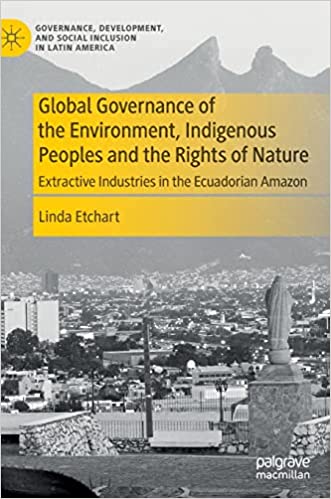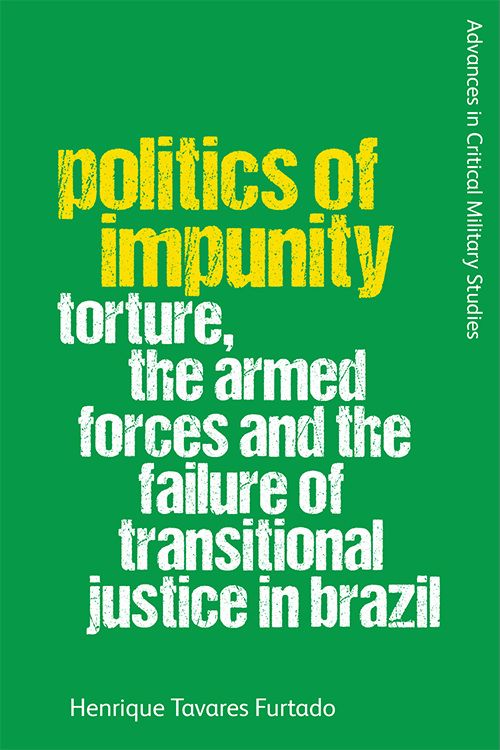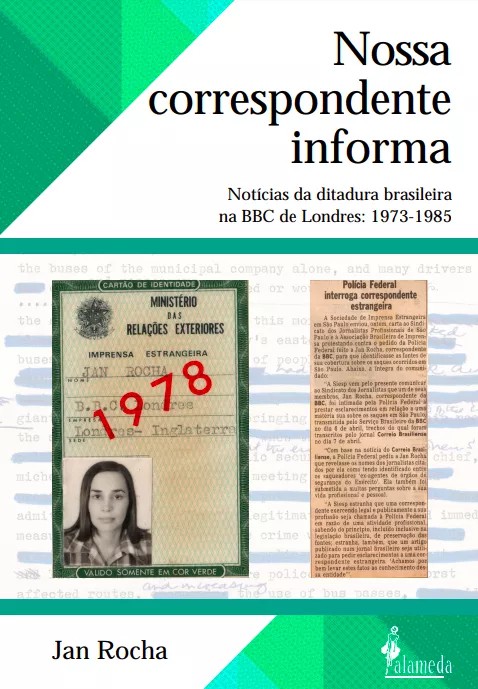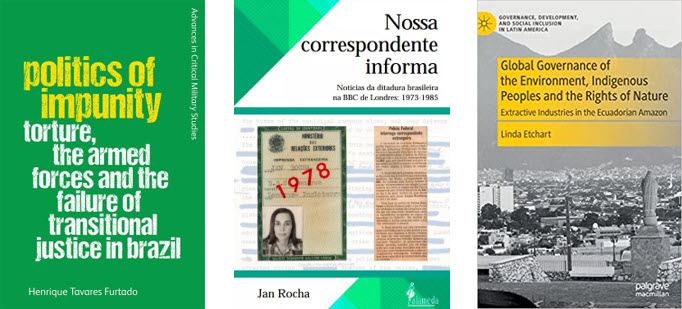LAB authors have released three new books recently.
Ecuador: Indigenous Peoples vs Extractive Industries
Linda Etchart is a member of LAB’s Council and an expert on indigenous communities in Ecuador. She has been a lecturer in Human Geography and has taught at at Kingston University, London, Birkbeck College, London and Anglia Ruskin universities. Her published work is in the area of conflict transformation and the role of indigenous peoples in global governance. She was the author of the chapter on Indigenous Peoples and the Rights of Nature in LAB’s book Voices of Latin America.
Linda’s new book is:
Global Governance of the Environment, Indigenous Peoples and the Rights of Nature: Extractive Industries in the Ecuadorian Amazon (Palgrave Macmillan, 2022).

This book explores the obstacles facing indigenous communities, non-governmental organisations, governments, and international institutions in their attempts to protect the cultures of indigenous peoples and the world’s remaining rainforests.
Indigenous peoples are essential as guardians of the world’s wild places for the maintenance of ecosystems and the prevention of climate change. The Amazonian/Andean indigenous philosophies of sumac kawsay/suma qamaña (buen vivir) were the inspiration for the incorporation of the Rights of Nature into the Ecuadorian and Bolivian constitutions of 2008 and 2009. Yet despite the creation of the United Nations Permanent Forum on Indigenous Issues (2000), and the adoption of the United Nations Declaration on the Rights of Indigenous Peoples (2007), indigenous peoples have been marginalized from intergovernmental environmental negotiations. Indigenous environment protectors’ lives are in danger while the Amazon rainforests continue to burn.
By the third decade of the 21st century, the dawn of “woke” capitalism was accompanied by the expansion of ethical investment, with BlackRock leading the field in the “greening” of investment management, while Big Oil sought a career change in sustainable energy production. The final chapters explain the confluence of forces that has resulted in the continued expansion of the extractive frontier into indigenous territory in the Amazon, including areas occupied by peoples living in voluntary isolation.
Among these forces are legal and extracurricular payments made to individuals, within indigenous communities and in state entities, and the use of tax havens to deposit unofficial payments made to secure public contracts. Solutions to loss of biodiversity and climate change may be found as much in the transformation of global financial and tax systems in terms of transparency and accountability, as in efforts by states, intergovernmental institutions and private foundations to protect wild areas through the designation of national parks, through climate finance, and other “sustainable” investment strategies.
Global Governance of the Environment, Indigenous Peoples and the Rights of Nature: Extractive Industries in the Ecuadorian Amazon is available to purchase from Amazon.
The politics of Impunity in Brazil
Henrique Tavares Furtado is a member of LAB’s Council. He is a Senior Lecturer in Politics and International Relations in the Department of Social Sciences at the University of the West of England. His research investigates processes of accountability in the wake of mass atrocities, focusing on the links between the memory of political violence and the implementation of transitional/post-conflict justice. His other research interests involve political mobilisations of the language of trauma, Latin American politics, decolonial conceptualisations of violence and critiques of exceptionalism in Global politics.
Henrique’s new book is:
Politics of Impunity: Torture, The Armed Forces and the Failure of Transitional Justice in Brazil (Advances in Critical Military Studies series, Edinburgh University Press, 2022).

This book analyses the struggles for accountability and the resurgence of militarism in Brazil.
- Provides an extensive analysis of Brazilian official documents of the truth commission, including semi-structured interviews with activists and practitioners, still unseen in English
- Opens a pathway for exchange and comparison between representations of militarism and different strategies for resisting military violence, from both the Global North and the Global South
- Reveals non-Eurocentric ways to represent and think about militarism by investigating the work of local scholars and practitioners in Brazil
- Explores links between debates on critical militarism studies and processes of truth and reconciliation
- Focuses on the concept of resistance to militarised violence, an increasingly important topic in the social sciences
- Provides one of the first initial insights into the rise of the far-right in Brazil and the re-emergence of historical revisionism about the military past
Politics of Impunity investigates the failure of the anti-impunity agenda in Brazil, from the release of the truth commission report denouncing the crimes of the military regime (1964-1985) in 2014, to the election of the former-paratrooper and far-Right leader Jair Bolsonaro in 2018. Connecting debates on critical military studies, transitional justice and memory studies, the book moves beyond the conditions of implementation of accountability measures. It examines the conditions of possibility of the global anti-impunity agenda: when, how and why the question of impunity came to dominate debates on large-scale political violence.
Politics of Impunity: Torture, The Armed Forces and the Failure of Transitional Justice in Brazil is available to purchase here.
The Brazilian Dictatorship – a reporter’s story
Jan Rocha is a former correspondent for the BBC and The Guardian. She is LAB’s regular correspondent in São Paulo, Brazil, author of over 80 articles in Jan Rocha’s blog on the LAB website. She is author of several LAB books:
Brazil Inside Out; Brazil in Focus; Brazil Under the Workers Party; Cutting the Wire – The Story of the Landless Movement in Brazil; and Murder in the Rainforest.
Jan is also the author of Denouncing the Dictators – How a small human rights group in Brazil became a centre for resistance to Operation Condor’s reign of terror in 1970s South America. LAB hopes to publish this title later in 2022.
Jan’s new book is:
Nossa Correspondente Informa: Notícias da ditadura brasileira na BBC de Londres (1973-1985) (Alameda Editorial, 2021).
Notícias da ditadura militar brasileira na BBC de Londres é uma lição de história. Entre 1973 e 1975

O livro Nossa correspondente informa – notícias da ditadura militar brasileira na BBC de Londres é uma lição de história. Entre 1973 e 1985, a jornalista Jan Rocha foi correspondente da BBC de Londres no Brasil. Com enorme frequência, às vezes com mais de uma notícia por dia, ela traduzia ao mundo o que estava ocorrendo no Brasil, na forma de notas, em geral breves, que iam ao ar em inglês e também eram traduzidas para o serviço brasileiro da rádio britânica.
Queimadas, invasão de terras indígenas, perseguição a religiosos, inflação, descontrole cambial, falta de planejamento, saúde pública caótica, sonegação de informações, alteração das regras do jogo político de acordo com as conveniências: o dia a dia da ditadura, mostram notícias de Jan Rocha, simples e diretas, era um verdadeiro inferno. A ideia de “quem não fez nada de errado não sofreu” durante o período, tão difundida (e falsa, porque se opor ao regime era, sabemos, a coisa certa a se fazer) pelo revisionismo e pelas fake news, se mostra absolutamente equivocada diante da realidade.
Quando Jan Rocha começou a colaborar com a BBC no Brasil, em 1973, a luta armada contra a ditadura já tinha acabado, o país estava prestes a entrar na “abertura lenta, gradual, porém segura” prometida pelo general Ernesto Geisel e seguida pelo seu sucessor, o general João Figueiredo. Mas a repressão ilegal do estado continuava e começava a transformar-se em terrorismo de estado, executado pela linha-dura do exército para tentar impedir a “abertura” e o retorno à democracia, ao estado de direito.
A abertura, também é possível perceber na leitura sequencial das notícias, foi mais lenta do que gradual e segura: foi cheia de solavancos, sobretudo quando a ultradireita deu início a uma série de atentados, ora nitidamente para intimidar opositores, ora para responsabilizar a esquerda, numa guerra de fatos e informações. Esses numerosos atentados, contra a Ordem dos Advogados do Brasil, a Associação Brasileira de Imprensa, o jornal O Estado de S. Paulo, além do conhecido e felizmente malogrado caso do Riocentro, entre tantos outros, nunca foram seriamente investigados. E, ao contrário do que ocorreu com os opositores, que pagaram frequentemente o preço do engajamento político com a própria vida ou longos anos de prisão, a direita explosiva jamais pagou por seus atos de violência, mesmo os executados após a lei da Anistia de 1979.
Esta coleção de despachos de Jan Rocha mostra uma profissional exemplar, em que o rigor jornalístico anda lado a lado com a coragem e a sensibilidade humana. Este livro é um exemplo de como é preciso retomar a história da ditadura para além das narrativas oficiais, que minimizam as dores e os sofrimentos da maioria da população.
Nossa Correspondente Informa: Notícias da ditadura brasileira na BBC de Londres (1973-1985) is available to purchase here.


